Reagan Library Debate Winners And Losers
There were eight people on the stage last night, but the GOP field has narrowed significantly.
After a summer filled with a debate between the also-ran candidates, a mostly lackluster CNN debate, and a debate in Iowa that had the shadow of Rick Perry hanging over it, last night’s Reagan Library debate was the first real opportunity for voters to see what is most likely the full Republican field together in one forum. For the most part, it was a good debate that avoided many of the pitfalls that we’ve seen over the past several months. Brian Williams and John Harris kept the questioning mostly to the economy, jobs, and health care (meaning there was barely a mention of foreign policy) and, except for an odd segment where they brought in Telemundo anchor Jose Diaz Balart in to ask a question about immigration then quickly dismissed him, managed avoid having the debate format turn into part of the story. Perhaps the best innovation was the elimination of opening and closing statements from the candidates, which tend to serve no purpose whatsoever and take away time that could be devoted to actually asking questions.
As James Joyner notes this morning, the big take away from the debate was the clash between Texas Governor Rick Perry and former Massachusetts Governor Mitt Romney. The two butted heads on jobs records, spending, health care and, perhaps most importantly, Social Security and Perry’s decision to stick with his previous comments that the program is a “Ponzi scheme” and “monstrous lie.” And, not surprisingly, it’s the Romney-Perry clash that dominates the reactions across the blogosphere.
Townhall’s Kevin McCullough called the debate a big win for Perry:
What the nation saw was a man who thought before he spoke, chose words wisely, and in whatever moment he found himself in, someone who wasn’t merely able to be conversant about the issue, but penetrate the tone, spirit, and focus of the discussion that caused everyone else on the stage to respond… to him!
This would’ve been a win for Rick Perry just on the mathematical equation of judging debates. But considering the increased odds he was up against, the smoothness with which he won, translates into massive points of confidence of those already supporting him, and for those yet decided, his plain speak common sense drew them in.
Odds were this debate could’ve set up a huge battle between Romney and Perry kicking off with Romney landing damaging blows. That picture never happened.
Romney was basically defeated for the night when the discussion turned to Romneycare. His refusal to address the issue, and to pretend to change the subject to giving all fifty states waivers to Obamacare was deflated the moment Bachmann (who touted another strong performance) hit back with “overturn” not “waivers” is the only true solution.
Erick Erickson agrees with McCullough:
It is clear Perry is the front runner given the pile on from the other candidates. It was David Frumnot just pushed by MBNBC and the Politico. The other candidates took willful potshots against Rick Perry. Perry, despite some stumbles and the pile on by the moderators and other participants, held his own and will only get stronger the more of these he does. And if he doesn’t?
Others on the right who are not as enthusiastic about Perry were more skeptical about Perry and his performance. found Perry to be woefully unprepared, while Jennifer Rubin had this to say:
Perry survived, but without erasing doubts about his candidacy. Potentially damaging traps were set on HPV testing, HillaryCare and Social Security. The debate was a bit of an equalizer, and may in fact help to remind voters of some of the other candidates. For Romney, he engaged with Perry cautiously, with his most effective moments being his skewering of Perry’s position on Social Security and his explanation of his private-sector experience at Bain. Contrary to the hysterics in the blogosphere, this race is far from over. In fact, I think they are just warming up.
And Rod Dreher, who returned to blogging this week with a new blog at The American Conservative, was similarly unimpressed by Perry:
My big takeaway of the evening is that Rick Perry emerged (barely) as the winner, if “winner” is a word that can properly describe this crew. Perry seemed sure of himself most of the time, and projected gravitas, except for some stumbles that may not look like stumbles (more on which later). Romney seemed strangely insubstantial next to him. Why on earth didn’t Romney go after Perry more? Santorum, Paul, and Bachmann all pummeled Perry on the HPV vaccine issue, and then Romney, when invited in to finish him off, chastised the others for being mean to ol’ Rick, and reminded them all that the enemy is Obama. Romney apparently still thinks he’s running against Obama, not Rick Perry.
I’m thinking I’d better get used to Perry, because we’re going to be seeing a lot more of him.
There were other candidates on the state last night, of course, but it’s not at all surprising that the analysis is focusing on the Perry-Romney clashes because, if last night, confirmed one thing it’s the fact that this is in fact now a two person race between Mitt Romney and Rick Perry, although a few candidates managed to pull off a few surprises
Mitt Romney: As he has in previous debates, Romney continued last night with the strategy of trying to present himself as the competent, moderate guy who can actualy win the election. That’s a strategy that has worked well for him so far but, with Rick Perry in the race now, he also needs to start drawing distinctions between himself and Perry. That started right off the bat right now, with Romney picking up on many of the criticisms of Perry’s jobs record that have come out in the three weeks since Perry entered the race. Romney also hit Perry hard on his comments about Social Security, clearly hoping to get Republicans wondering about the electability of a candidate who is so directly confrontational about one of the most popular programs run by the Federal Government. It’s no surprise that Romney performed well in the debate since he’s been in the candidate business for years now, but to some extent he was an interesting contrast to Perry, who didn’t seem entirely comfortable under his skin.
Rick Perry: I’ve got to agree with those who say that Perry didn’t knock it out of the park here. He did well enough I suppose, and he served up plenty of red meat to the Tea Party crowd, but he also didn’t entirely erase the questions that more mainline Republicans are likely to have about his candidacy, and his electability in a General Election. The Social Security issue will continue to dog him, for one, as will the questions about health care and education in Texas. When Perry was faced with a question about foreign policy and his statement in a speech to the VFW regarding avoiding foreign intervention, Perry stumbled and completely failed to answer the question of how that policy would apply to an evaluation of something like the Iraq War. Most of all, though, he seemed uncomfortable in that area and probably benefited from the fact that the debate spent almost no time talking about foreign policy. Perry needs to hit the briefing books on that topic, though, because it’s going to come up again.
Michele Bachmann: Less than a month after winning the Ames Straw Poll, last night saw Michele Bachmann pushed back down to the status of a second tier candidate. With most of the attention focusing on Perry v. Romney, though, it took all of 15 minutes for Bachmann to be asked a question. She repeated all the Tea Party talking points we’ve come to expect from her, but it rang hollow this time. With Perry in the race, the argument for Bachmann is far less compelling and it’s going to take a huge mistake on Perry’s part (which he’s unlikely to make) for her to get back to where she was before he entered the race.
Jon Huntsman: Going into the debate, there were reports yesterday that Huntsman had come down with a cold so one wondered if he’d be able to say much of anything that would get much attention. Despite being far behind in the polls, though, he got plenty of air time and, despite the cold, he managed to make a fairly decent case for himself even though it’s unlikely that people were paying attention. Huntsman scored some “gotcha” points when he pointed out that Utah had a better job creation record than either Texas or Massachusetts did with Perry and Romney in charge. He displayed sober, reasoned positions of trade with China and the war in Afghanistan, and he avoided falling into the trap of starting a fight with his fellow candidates over climate change and evolution by using the question to point out that it’s jobs that most Americans care about. In a different year, under different circumstances, Huntsman would be a clear first tier candidate, and one can be hopeful that if a Republican wins in 2012 they’d consider tapping his experience for a cabinet position (Secretary of Commerce perhaps?), but this just isn’t Jon Huntsman’s year.
Herman Cain: More so than ever before, Cain was an als0-ran at this debate. I can’t recall a single stand out moment for him, nor can I recall any real flubs. After last month’s poor performance in Ames, though, I’m not sure that it matters. Cain is running this campaign on a shoestring and will decide when he wants to get out, but he’s really not a consequential figure at this point.
Rick Santorum: As with last month’s debate in Iowa, Santorum’s one memorable moment came in a confrontation with another candidate. Last month it was Ron Paul and foreign policy. This month, it’s Rick Perry and the HPV vaccine controversy. It’s an issue that plays to the evangelical base that Santorum draws support from, but it seemed like a pointless discussion in an era when people are concerned about jobs. Like Cain, Santorum is on a shoestring and putting all his hope on a surprise performance in Iowa. Nothing last night indicates that he’ll get his wish.
Newt Gingrich: Gingrich continued his schtick from the Iowa debate by attacking the questioners on several occasions and chiding them for trying to get the candidates to criticize their fellow Republicans rather than President Obama. Given that this is an eight person primary race, and that each candidate presumably believes that they are uniquely qualified to be President, it doesn’t strike me as all that scandalous that they’d be asked to contrast themselves with the other candidates. This is Newt, however, and this is the horse he’s riding right now. One wishes that Williams or Harris had asked Gingirch one simple question…….why are you still in the race?
Ron Paul:Ron Paul was his usual idealistic self last night, which meant that he didn’t shy away from talking about eliminating the Food and Drug Administration, the Environmental Protection Agency, or the TSA. Not exactly talking points that are going to win you an election, but vintage Ron Paul. The one difference from previous debates, is that the audience clearly wasn’t as packed with Paul supporters as it had been a previous debates, most likely because the Reagan Library was controlling access. This left Paul with a few moments where lines that would’ve gotten cheers in other venues mostly fell flat. Paul was entertaining as always, but largely inconsequential.
Hanging over the debate, of course, was the spirit of Ronald Reagan, with the plane he flew in for eight years as President sitting just a few feet away from the stage, his wife sitting in the front row, and his grave within walking distance outside the building. More than once, it led one to wonder what Reagan would think about the candidates that were using his stage. Would he agree that Social Security, which he helped save from a previous fiscal crisis in the early 1980s, was a monstrous lie and an unconstitutional Ponzi scheme? Would the man who engaged in this rational, reasoned debate on immigration agree with people who want to construct a border fence and dodge the question of what to do about the 14,000,000 people who’ve been living here illegally but otherwise contributing to society? Would he agree that tax increases can never be on the table in budget negotiations? More than ever, last night’s debate demonstrated the extent to which the GOP has changed since Reagan’s era, whether the people on the stage last night want to admit it or not.
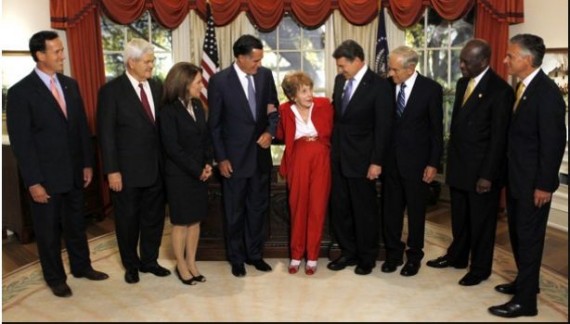

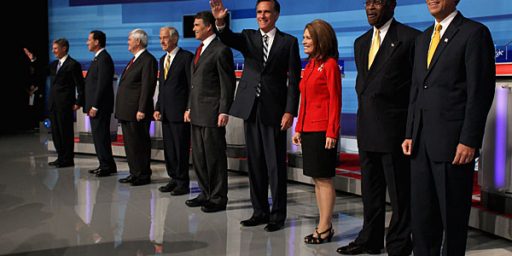
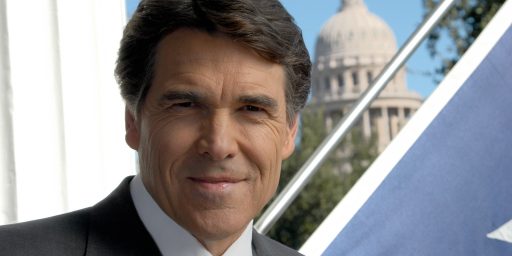

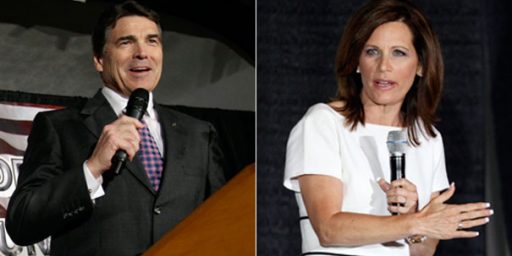
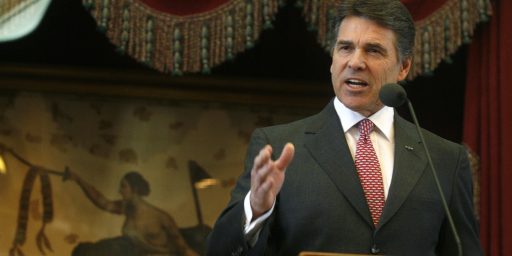
“between Texas Governor Rick Perry and former Massachusetts Governor Rick Perry. ”
Man, I knew I felt like I didn’t have many choices here, but this field is getting smaller by the day.
@gawaine:
I blame lack of coffee interacting with brain cells. Fixed
By attacking each other the way they did, it seems to me that Romney and Perry both sucked the oxygen out of the room with regard to the other candidates. Romney pretty much had to attack/distance/distinguish himself from Perry, but by doing so, he’s admitted it’s really a two person race.
That being so, overall I’d say this debate was “advantage Perry” regardless of specific individual scoring since Romney desperately needs more ‘Tea Party’ types to draw off some of Perry’s support.
Perry can get support from the so-con, moderate, and tea-party branches of the GOP. Romney really can’t.
-Polaris
The only way to win is not to play. Anybody who didn’t watch won.
Wow. I thought that Romney was the clear winner, and Perry was absolutely awful.
I do recall qualifying my statements to friends that I watched with to include the fact that I really could not imagine how the rabid Republicans would react.. But I didn’t really think that anyone could watch this debate and think Perry did well.
This is really sick party. Not to even begin to reflect upon the swell of cheering for the executions (in the context of a question that seemed to obviously, though obliquely, be referring to the case of Perry’s execution of an innocent man).
@Polaris: Perry can get support from the so-con, moderate, and tea-party branches of the GOP. Romney really can’t.
Um, I’ll agree with you on 2 out of 3 there, but Perry’s downfall is that he can’t get *any* moderate votes.
I ran across an interesting opinion on Perry’s “Social Security as Ponzi scheme” position at Reason. Talk about doubling down on your bet!
@Boyd:
The Libertarians at Reason may agree with Perry, but we’ll see soon enough how the retirees in Florida and South Carolina feel about it. Even Republicans, if they are old enough, are going find Perry’s rhetoric hard to swallow.
Republican voters are older than Democratic voters. Those old, gray haired Tea Partyers may soon find out that sometimes you get what you wish for.
Related: A More Progressive Tax System Makes People Happier, 54-Nation Study Finds
So, Paul is inconsequential because he wants to end the unlawful agencies “…Food and Drug Administration, the Environmental Protection Agency, or the TSA…” Really? I hope people like you can find some principles before its too late. The country’s bankrupt, millions of people losing their homes, we have the largest prison population in the world, multiple wars… Yet Paul is inconsequential… Sad.
@Tano: You raise an excellent point… and highlight the difference between the democratic base and the republican base. You think Romney won because he seemed more rational and prepared. Most of the rightys think Perry won because he seemed more unrepentantly bloodthirsty.
Guess which one has the better chance of taking the nomination…
Paul is inconsequential because he wants to end the unlawful agencies
Yes, and the fact that he thinks a border fence will be built to keep Americans from escaping. And he thinks the government has no business managing air traffic control. And a whole host of other nutball positions he holds. That’s why he is inconsequential. He’s nuts.
I was busy with family so I didn’t get a chance to watch. However if Tano hated Perry and thought he suck, bonus goes to Perry.
The problem with “moderates” is there are fewer and fewer of them. Conservative numbers have been increasing in recent years. People are getting tired of fence sitters.
@Wayne: The fact that you equate ‘not deciding what the answer is before you understand the question’ with ‘fence-sitting’ is why you are a simpleton whose opinions are not respected.
John Cole quotes Chait explaining my comment to Tano much more eloquently than I:
@legion
And where did I say that? You are making stuff up and that is why you are delusional.
@Wayne: Your implication that being “moderate” is inherently bad seemed pretty clear to me… If I am mistaken, I would gladly hear more.